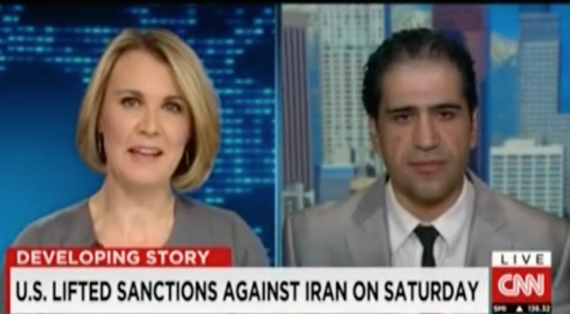Iran's major state-owned newspaper, Keyhan, in which its editor-in-chief is the representative of the Supreme Leader Khamenei, proudly outlined on its first page that Iran received the first delivery of the formerly-forbidden advanced missile defense system, the S-300 system, from Russia this week.
The Islamic Republic also blatantly rejected the regional proposal by OPEC members and other major oil-producing nations to join and freeze oil output in order to address a global surplus.
Iran will not accept such proposals to cut oil output in order to rebound oil prices anytime soon. In fact, according to Oil Minister Bijan Zangeneh, Iran has the total potential to ramp up oil export to 4 millions barrels a day. This will have a significant negative impact on oil prices, not only impacting the regional countries' revenues, but also the global market.
For Iran, the cash is flowing. Iran's oil revenue has currently increased approximately 90%, in only a few months after sanctions were lifted, from $12 billion per year to $21 billion per year. This revenue is based on the current low prices of oil, and selling roughly 1.7 million a barrels a day. Approximately 29% of Iran's crude oil is being exported to European countries including Spain, Greece, and France. The export to European nations will definitely increase as Iran expands its output.
This means that, even at the current low oil prices, Iran's oil revenues will be around $50 billion a year, almost 500% of Iran's oil revenue of pre-sanctions.
The Cash and Western Support
Unshackled from the United Nations Security Council sanctions, Iran is only warming up to fully exert its influence in the region, change the political chessboard of the Middle East further, and tip the regional balance of power in its favor.
For over three decades, the Islamic Republic preferred to employ soft power rather than hard power, in order to insert its influence in other Sunni Arab nations. Over the three decades, Iran infiltrated almost every Middle Eastern country by building alliances with the Shiitte communities, or by arming, training, financing and giving birth to Shiite militias or oppositional groups.
Iran's foreign policy has been unique in that regard; Iranian leaders' geopolitical, ideological and regional hegemonic ambitions have been consistent since the establishment of the Islamic Republic.
Nevertheless, having been previously alienated regionally and globally as well as chained with the shackles of international sanctions, Iran's ruling clerics did not have any option other than to hide their imperialistic intentions, employ soft power and deny any intervention in other nations.
Liberation, Imperialism, and the West's Confinement
Through the nuclear deal, once Iran is liberated from the confining bars of international sanctions, there is no need for Iranian leaders to hide their intentions anymore.
This is due to the notion that the nuclear deal not only meant the liberation of Iran's ruling clerics, but also the confinement of the US and Western powers to re-punish Iran. As the Persian Saying goes: We tied their hands and feet together.
As a result, it is not Iran that is chained anymore by its nuclear program, but it is the US that is being handcuffed with the nuclear deal.
From the perspectives of the Iranian leaders, it does not make sense anymore to geopolitically and ideologically employ soft power rather than hard power.
The Islamic Republic is cognizant of the fact that, first of all; Tehran has the West off its back- because the West want to do business with Iran (mainly oil and gas), fight the Islamic State through Iran, and the West knows that it can not anymore reverse the nuclear deal due to Russia and China's veto power in the United Nations Security Council.
Secondly, the cash is flowing in Tehran and Iran is aware that it enjoys the support of two major global powers, Russia and China. Third, Tehran knows that its children, the Shiite militia across the region, are being empowered day by day, and they are absolutely loyal to the ideological principles of the Islamic Republic, and that they will fight for Iran to the end, in any country including Syria, Iraq, Lebanon, Yemen, Bahrain, etc.
The Supreme Leader of Iran, Ayatollah Khamenei, and the senior cadre of Iran's Revolutionary Guard Corps (IRGC) analysis indicates that it is totally in their interest to show the region Iran's military capabilities, such as Iran's Quds force, on the ground in other Arab countries. For the ruling Iranian politicians, it is currently in their interests to shift tactics and publicly launch ballistic missiles, in violation of the UN resolution, to publicly support Bashar Al Assad who has killed tens of thousands of his own citizens, and to publicly acknowledge the IRGC role in Iraq, Yemen, and other countries.
Being cognizant of all the aforementioned assets, Iranian politicians view it in their parochial interests to publicly pursue their Islamic-Persian imperialistic ambitions, regional hegemonic and ideological objectives by ostentatiously and overtly attempting to tip the regional balance of power in its favor, by publicly provoking other countries in the region, and by challenging other nations.
Dr. Majid Rafizadeh is an American political scientist, business advisor and the president of the International American Council on the Middle East. Harvard-educated, Rafizadeh serves on the advisory board of Harvard International Review. An American citizen, he is originally from Iran and Syria, lived most of his life in Iran and Syria till recently. He is a board member of several significant and influential international and governmental institutions, and he is native speaker of couple of languages including Arabic and Persian. He also speaks English and Dari, and can converse in French, Hebrew.
You can sign up for Dr. Rafizadeh's newsletter for the latest news and analyses on HERE. You can also order his books on HERE.
You can learn more about Dr. Rafizadeh on HERE.
You can contact him at Dr.rafizadeh@post.harvard.edu or follow him at @Dr_Rafizadeh. This post first appeared on Al Arabiya.

